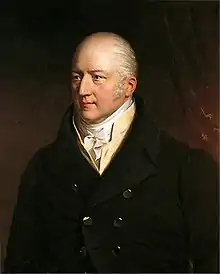Joseph Marryat (1757–1824)
Joseph Marryat (1757–1824) was an English merchant, banker, and a Member of Parliament for Horsham. He was a slave-owner and a strong opponent of abolitionism.[1]

Family
Marryat was of Huguenot descent. His father was the medical writer and physician Thomas Marryat. He became a West Indian merchant and served as chair of Lloyd's from 1811 until his death. He lived in Sydenham, Kent, and at Wimbledon House, Surrey.[2]
Marryat's wife was the American Charlotte, née von Geyer, one of the first women admitted to membership of the Royal Horticultural Society, on the strength of her garden at Wimbledon House. She died in 1854.[3]
The couple had several children. Joseph Marryat (1790–1876)[4] likewise became a member of Parliament. Frederick Marryat became a noted novelist and Royal Navy officer. Horace Marryat became a travel writer, notably on Scandinavia. The younger Joseph and Charles Marryat would inherit hundreds of slaves from their father after he died on 12 January 1824.[3]
Slavery and the slave trade
Joseph Marryat was an absentee slaveowner in Jamaica, St. Lucia, Trinidad, and Grenada.[3] He was also a significant figure in the slave trade; Marryat owned slave ships, helped to develop the London Dock Company, and joined the London bank of Sir Charles Price, 2nd Baronet, based at 1 Mansion House Street. The bank became known as Marryat, Kay, Price and Coleman once he became head of the firm in the 1820s.[3] Accordingly, Joseph Marryat was an ardent opponent of abolitionism, active in Parliament and engaging in polemical debate by issuing pamphlets and representing his peers as a prominent member of the London Society of West India Planters and Merchants.[5][3]
Publications
- Thoughts on the Abolition of the Slave Trade, and civilization of Africa, with remarks on the African Institution and an examination of the report of their Committee, etc. (1816) London: J. M. Richardson and J. Ridgway.
- More thoughts occasioned by two publications which the authors call "An exposure of some of the numerous misstatements and misrepresentations contained in a pamphlet commonly known by the name of Mr. Marryat's pamphlet, entitled Thoughts &c.", and "A defence of the bill for the registration of slaves", (1816) London: J. M. Richardson and J. Ridgway.
References
- "Joseph Marryat senior: Profile & Legacies Summary". Legacies of British Slave-ownership. UCL. Retrieved 12 October 2020.
- Taylor, Lawrence; Fisher, David R. "MARRYAT, Joseph (1757-1824), of Sydenham, Kent and Wimbledon House, Surrey". The History of Parliament. The History of Parliament Trust. Retrieved 30 July 2016.
- J. K. Laughton, "Marryat, Frederick (1792–1848)", rev. Andrew Lambert, Oxford Dictionary of National Biography (Oxford, UK: OUP, 2004) Retrieved 2 January 2016.
- History of Parliament. Retrieved 12 September 2019.
- Parliament biography. Retrieved 13 June 2020.
| Parliament of the United Kingdom | ||
|---|---|---|
| Preceded by Samuel Romilly Love Jones-Parry |
Member of Parliament for Horsham 1808 With: Henry Goulburn |
Succeeded by Sir Arthur Leary Piggott |
| Preceded by Charles Jenkinson John Spratt Rainier |
Member of Parliament for Sandwich 1812–1824 With: Sir Joseph Sydney Yorke (1812-1818) Sir George Warrender (1818-1824) |
Succeeded by Henry Bonham Sir George Warrender |